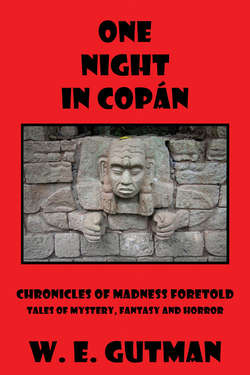Читать книгу One Night in Copan: Chronicles of Madness Foretold Tales of Mystery, Fantasy and Horror - W. E. Gutman - Страница 14
На сайте Литреса книга снята с продажи.
ОглавлениеIN HIS OWN IMAGE
There is no absolute, no reason,
no God, no spirit at work in the world: nothing
but the brute instinctive will to live.
Arthur Schopenhauer
It had never been done. It would never be tried again. Not even in a dream. Here was an unrepeatable chance event that upended the laws of potentiality and defied the very core of reason. Bear with me. Imagine absurdity challenging the sublime. Picture the unthinkable. And yet, against all odds, preposterous as it sounds, it happened: A driving force, heretofore unimagined, the offspring of a staggering abstraction that can’t be annulled once spawned -- nor left unexplored -- burst out of a single, indissoluble vanishing point.
Reaching into nonexistence (or emerging from it?) now ponderable if not fully manifest, suspended somewhere between immanence and dizzying inscrutability (as are all things when first caused), he endowed himself with being. In a single surge of cognition, exceeding his creative potential, he was now his own fait accompli. He had just invented himself.
Free from his cerebral cocoon, fully transfigured from genderless ambiguity to virile causality, he surveyed his completeness. Heeding a time scale of his own calibration, anxious to add purpose to will, meaning to intent, momentum to stimulus, he separated cause from effect, quintessence from character, provenance from possibility, state from circumstance, identity from distinction, metaphor from divergence. In short, he elaborated all manner of paradox and contrariety which would forever set him apart from those who are not, and can never be him.
To avert any confusion between him and the teeming realm his incarnation would evoke, he relinquished form for unquantifiable symmetry; he traded transparency for impenetrability. His geometry would be indivisible and without limit, here brimming with presence, there immersed in desolation so vast that even time would stand still at points unmarked and of his own design.
He then granted himself the capacity to remain unmoved by sorrow and calamity. To justify such dispassion, he endowed himself with ostensible kindness and discernible unkindness, allowing himself to be perceived as possessing equal amounts of benevolence and evil, munificence and heartlessness, genius and imbecility, as circumstance dictated, and depending upon prevailing moods and attitudes.
Now armed with an ego, he gave himself an indecipherable name by which others would know him. Some followed him in silent awe. Others, whose cries were never heard, wept and suffered and died forgotten because pain, by some outlandish precept, is a path out of bondage. His ear inattentive and his breast unfaithful to the throngs who called on him and sought his succor, he was forgotten, in time, like a distant tragedy, like a bad dream.
Cynics suggested that he’d been a figment of his own imagination. Others, with greater forbearance, offered that, in a supreme act of mercy, having lost faith in his own inflated image, using his extraordinary powers, he nullified himself for the good of all.
A great, raging, thunderous roar shook his domain. And the legend, so carefully preserved and perpetuated, was soon forgotten. No one knows for sure whether he was insane or whether those he caught in his devilish trap had lost all reason.
And peace eternal reigned at last upon the remnant few left to ponder the incongruity of being God.
